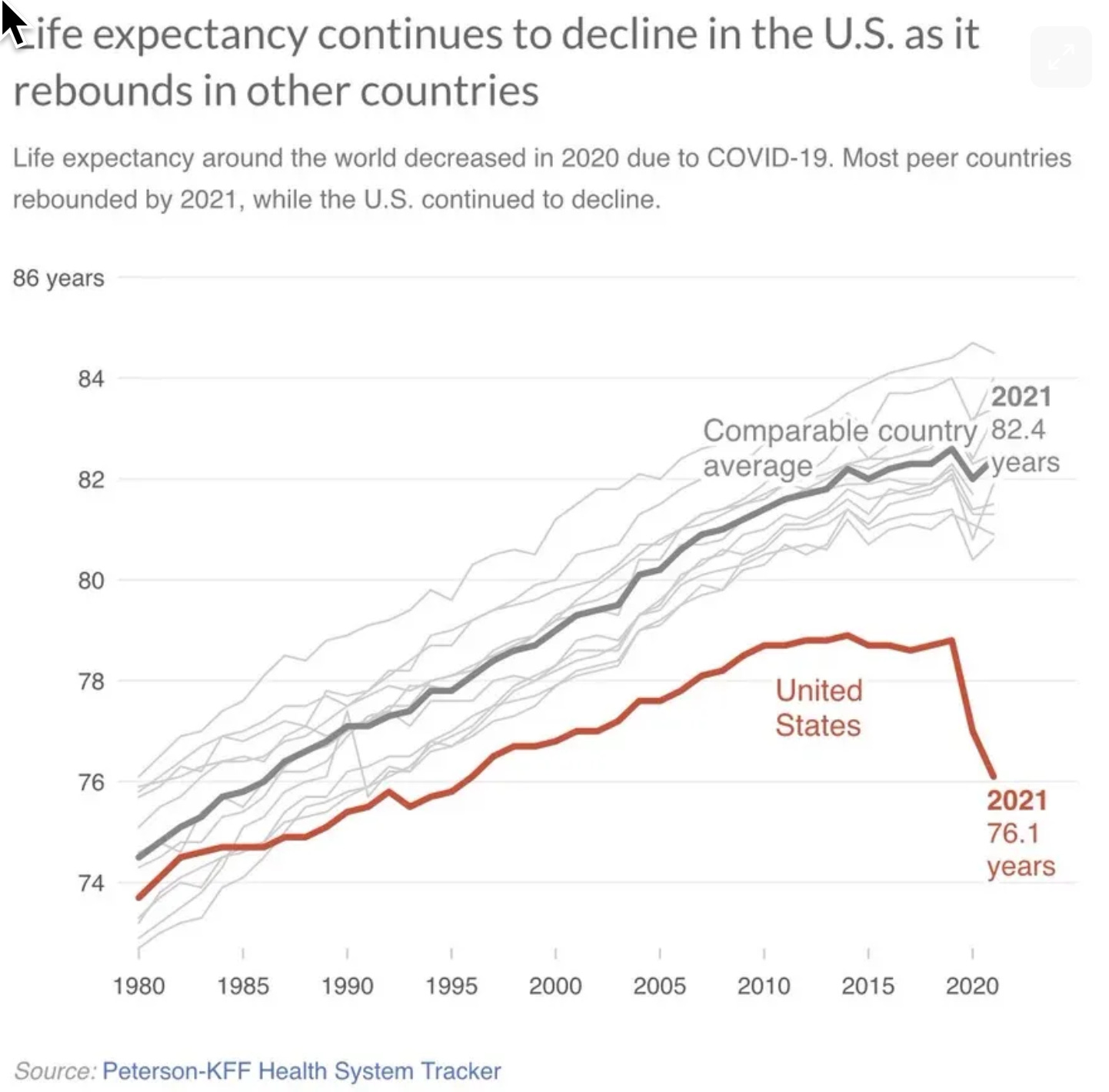BRIEFLY NOTED: FOR 2023-09-12 Tu
Is "European military revolution still a thing?; alien (octopus) minds; Jesus H. Christ U.S. mortality; very briefly noted; Frawley needs therapy, Bell orates, Smith praises Star Trek, McKenzie has...
Is "European military revolution still a thing?; alien (octopus) minds; Jesus H. Christ U.S. mortality; very briefly noted; Frawley needs therapy, Bell orates, Smith praises Star Trek, McKenzie has a potential “Nazi Bar” problem, & DeLong reviews Henriques & Coates, & briefly notes…
MUST-READ:
In 1500 Europe was a backwater. And historians of the wider world are bemused when they watch how historians of Europe cheer its civilizational advances from ca. 1200 feudalism to ca. 1700 commercial-imperial society. As Patricia Crone snarked:
To a historian specializing in the non-European world there is something puzzling about the excitement with which European historians hail the arrival of cities, trade, regular taxation, standing armies, legal codes, bureaucracies, absolutist kings and other commonplace appurtenances of civilized societies as if they were unique and self-evident stepping stones to modernity: to the non-European historian they simply indicate that Europe had finally joined the club…
But Europe (or at least some Europeans) as of 1700 are doing things differently from what is going on in the other gunpowder empires. They rule the seas. They have conquered the Americas. And, after 1700, a European-trained and European-officered army could enforce its will in the short-run everywhere that its barge-train and bullock-train logistics tail could keep it in supply. It was, to some degree, ship design. But it was not, except in scattered times and places, gunpowder weapons—gunpowder was straightforward once you learned the recipe and began harvesting saltpetre, and muskets were artisan-made. It was '“organization” and “practice”. But where and how did those develop?
Davis Kedrosky has a very, very interesting take on the admittedly overly Eurocentric literature on this comparative state power as of 1700 question. His conclusions:
Davis Kedrosky: Is there still life in the Military Revolution?: ‘Early modern Europe was an exceptionally violent place…. Yet Europe's internecine struggles ended not in anarchy and poverty, but in industrialization and empire…. The "military revolution" thesis…. (1) Interminable warfare led European polities to develop increasingly expensive technologies and tactics… build up their fiscal systems…. The result was the characteristic 'national state' of the late eighteenth century…. (2) The key technological, organizational, and tactical innovations of the classic 'military revolution' phase [then] allowed Europeans to seize territory overseas, from Acapulco to Beijing….
I'll argue that: (1) The ‘military revolution’ thesis gets many of details wrong; for example: (a) The vaunted innovations in infantry tactics emphasized by these were not limited to 1560-1660…. (b) Artillery-infantry-cavalry combinations didn’t work… seamlessly… blowing holes in enemy lines with cannon and riding through with cavalry was as much a myth in 1614 as in 1914. (c) Fortresses could hinder as well as help state growth…. (2) [But:]… (a) The 'artillery fortress' contributed to army size and state expansion, though less than Parker emphasized. (b) Army sizes did expand… and this growth was a primary impetus for the development of the fiscal state. (i) War wasn't the only cause of state growth…. (3) The 'military revolution' is better understood as encompassing the centuries-long co-evolution of military technology/tactics and political organization that resulted (under the duress of military competition) in the eighteenth-century fiscal-military state (rather than any one sharp discontinuity)…
ONE IMAGE: Jesus H. Christ!
ONE AUDIO: Alien Minds—Þe Octopus:
<https://overcast.fm/+S_7n1yT5Q>
Sean Carroll:” ‘I talk with philosopher Peter Godfrey-Smith about what we can learn about minds by thinking about cephalopods. The study of cognition and sentience would be greatly abetted by the discovery of intelligent alien beings, who presumably developed independently of life here on Earth. But we do have more than one data point to consider: certain vertebrates (including humans) are quite intelligent, but so are certain cephalopods (including octopuses), even though the last common ancestor of the two groups was a simple organism hundreds of millions of years ago that didn't have much of a nervous system at all. Peter Godfrey-Smith has put a great amount of effort into trying to figure out what we can learn about the nature of thinking by studying how it is done in these animals with very different brains and nervous systems.
Blog post with transcript: <https://www.preposterousuniverse.com/podcast/2023/09/11/249-peter-godfrey-smith-on-sentience-and-octopus-minds/>
Very Briefly Noted:
Economics: John C. Coates, IV: The Future of Corporate Governance Part I: The Problem of Twelve: ‘The likelihood that in the near future roughly twelve individuals will have practical power over the majority of U.S. public companies…
Robin Wigglesworth: The Problem of 12—Redux: ‘A problem to be solved or only a dilemma to be managed?… John Coates: “Institutions[] to capture economies of scale in finance… threaten democracy…. How the political system responds to the threat is an important, quasi-constitutional choice. Extreme choices tend to be bad ones…
Joseph Politano: Celebrating Apricitas' 1-Year Anniversary: ‘Looking Back—and Forward—On This Newsletter…
YIMBYism: Binyamin Appelbaum: The Big City Where Housing Is Still Affordable: ‘Prosperous cities increasingly operate like private clubs… Tokyo is different. In the past half century… has added more housing units than the total number of units in New York City. It has remained affordable by becoming the world’s largest city. It has become the world’s largest city by remaining affordable…
Economic History: Steve Durlauf: How the World Became Rich by Mark Koyama and Jared Rubin and Slouching Towards Utopia, by J. Bradford DeLong: A Review Essay…
Economic History Association: ‘This year's Gerschenkron prize finalists (L-R): Vincent Delabastita, Vincent Ostermeyer, Lukas Rosenberger. This year's Nevins prize finalists are (L-R): Hannah Postel, Lillian Trotter, and Lukas Althoff…
Stefania Albanesi & Claudia Olivetti: Maternal Health and the Baby Boom: ‘U.S. fertility rose from a low of 2.27 children for women born in 1908 to… 3.21 children for women born in 1932…. Our hypothesis is… improvements in maternal health contributed…. We exploit the large cross-state variation in the magnitude of the decline in pregnancy-related mortality and the differential exposure by cohort…. The decline in maternal mortality is associated with a rise in fertility… [and then] a rise in college and high school graduation rates=…
Antisocial Media: Angreyea: Substack Notes and the Nazi Bar Problem…
Ezra Klein: ‘Musk keeps creating exodus shocks. He worsens the product, or insults a swath of the audience, or does something deeply offensive to core users, and creates explosions of demand for an alternative. He does this again and again. This will only get worse as the core economics of Twitter get worse, and the revenue and attention plays become more desperate…
Evil Tech Overlords: Duncan Black: A Great Man Writing About Great Men: ‘Doing PR for The Great And Good disguised as journalism/history has always been Isaacson's schtick, and this is what happens when the person you are doing PR for makes an angry phone call…. The linked piece in its entirety is such hagiography. Musk being brilliant, people telling Musk he's brilliant, Isaacson typing it all up…
NOTES & SubStack Posts:
Right-Wing Insanity: This is absolutely horrifying. Somebody badly needed therapy then—and, I would argue, needs therapy now:
Human Capital: By the time people reach the university, they are supposed to already have background knowledge of stuff, and of the mechanics of communication and thought. Thus university should be devoted to the teaching and sharpening of four skills: (1) presentation-of-self in written prose, (2) presentation-of-self in person and on video, (3) sifting truth from conflicting sources, and (4) calculating stuff. You can add -n to that (5) preparation for a particular profession as well. That would seem to me to lead to the conclusion that the English and Drama departments should be the best-funded heart of the university—but, I think, very different English and Drama departments than we currently have—for (1) and (2). For (3) and (4) it seems to me that History and Applied Math should be the hubs, with other related departments around them as spokes. And the biggest demands for (5) suggest that Biology, Computer Science, and Management should be in the next rank—with, again, other departments value arising primarily out of their usefulness to those core pre-professional ones. At least, that seems to be to be how a university that performs its educational function by design rather than by accident would be organized and funded:
Science Fiction: Noah Smith has become an evangelist not just for rabbits as the pet of choice, but for the revised post-Kelvin timeline post-J.J.. Abrams Star Trek franchise:
Given that the standard pattern is one of bad declining-quality fanfic, this comes as quite a surprise to me. I am going to have to see if Noah has his head screwed on straight here, or has simply gone insane.
The “Nazi Bar”: So Hamish McKenzie writes: “In the 2024 U.S. elections, vote for Substack <on.substack.com/p/in-the-2024-us-electi…>: We’re leaning into politics…. The smartest analysis, commentary, campaigning, and reporting about this election year will all be happening here…. The task of making Election ’24 “the Substack Election.” If you have ideas for how she can do that, please let us know! But the top comments on this post, are currently…
Again: top comments… [As] angreya wrote on Daily Kos <dailykos.com/stories/2023/4/24/2165309/…>, it’s “The Nazi Bar Problem”…. The chances of 2024 becoming “The SubStack Election” in a positive way depend on their recognizing they have a “Nazi Bar” problem. Otherwise, if 2024 becomes the “Substack Election” it will be the same way that 2016 is now known as the Facebook/Cambridge Analytica Election.







Antisocial Media: Angreyea: Substack Notes and the Nazi Bar Problem… writes [inserts mine]: Substack's official response to the uproar is basically, "Nazi bar? What's that?"..... The piece is an impressive bit of doublespeak and wishful thinking. .... But the gist of the response is that they [Substack] intend to do almost nothing about hate speech and harassment, leaving the writers to protect themselves by blocking people..... because Substack apparently won't do anything to stop that person. They are leaning heavily into the notion that free speech means allowing hate and pretending that because other platforms' moderation policies have not completely eliminated harassment, hate speech, and misinformation that moderation is worthless."
If Substack is thinking that way, then it needs to consider:
1) The right to free speech doesn't come with the right to be heard by everyone.
2) Substack ought to get off the pseudo-libertarian cloud. I think it was John S. Mill who once asked libertarians (I paraphrase): Should libertarians be free enough to sell themselves into slavery? If yes, then they are NOT for liberty (and thus, not libertarians). If no, then there must be rules and someone to enforce them.
The owners of Substack ought to know that they are not being anti-libertarian or anti-free speech if they formulate and enforce an anti-Nazi bar code of conduct. If they do not grasp that, then I'm sorry to conclude that they value only profits. They should know that when the time comes, the rest of us (I hope) will happily show that Substack doesn't get to make money off of us. I hope that is simple to grasp.
Noah and Star Trek. Actually I agree with him on ST:STW and ST:LD. ST:P not so much. Technically, ST:SNW is post the Kelvin timeline, but it seems to try to adhere to what little was known of captain Pike and the USS Enterprise. Pike definitely sees his fateful accident in his future. ST:LD is a fun take on ST. It is inventive and funny. The Crossover episode with ST:SNW was imaginative.
Now as for bunnies as a household pet. I only knew one person with a rabbit that was allowed the run of the house like a cat. Most people keep them caped, or outside. This seems rather cruel to me, like keeping birds in small cages, or even large animals in zoo cages. Only the San Diego Zoo seemed to create a better balance for its animals' lives.